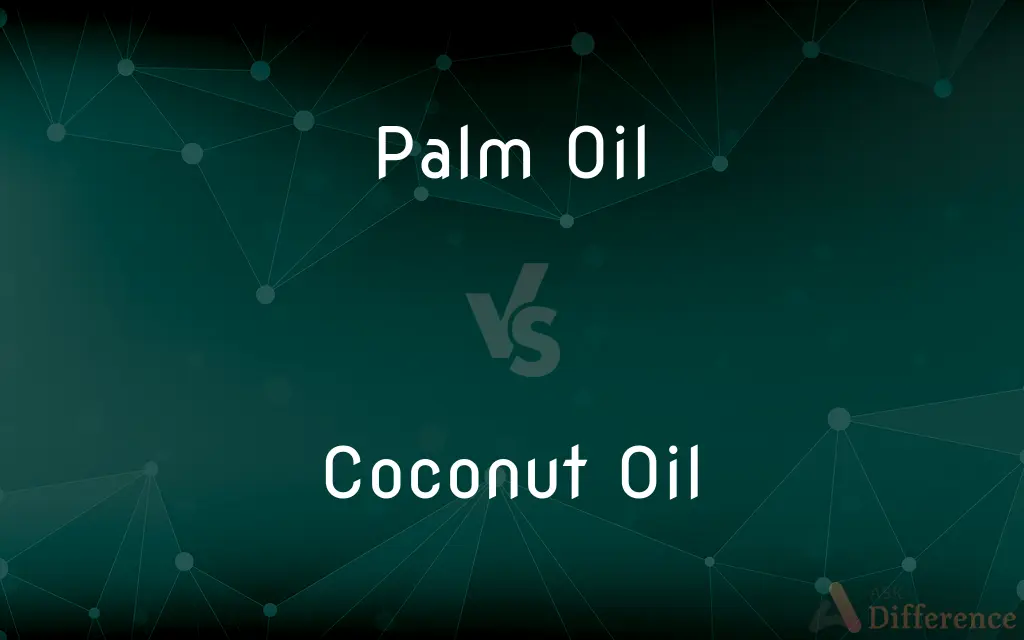Palm Oil vs. Coconut Oil — What's the Difference?
Edited by Tayyaba Rehman — By Fiza Rafique — Published on November 14, 2023
Palm Oil is derived from the fruit of oil palms, while Coconut Oil comes from the kernel of coconuts. Both are tropical oils, but they have distinct tastes, uses, and nutritional profiles.

Difference Between Palm Oil and Coconut Oil
Table of Contents
ADVERTISEMENT
Key Differences
Palm Oil and Coconut Oil are both extracted from tropical plants, but their sources are different. Palm Oil is obtained from the pulp of the fruit borne by the oil palm tree. It is often reddish in color due to its high beta-carotene content. Coconut Oil, on the other hand, is sourced from the kernel or meat of mature coconuts harvested from the coconut palm. Its color is generally clear to white, depending on its form (liquid or solid) and processing.
When it comes to culinary applications, both Palm Oil and Coconut Oil have their own unique properties and flavors. Palm Oil has a mild flavor and is often used in cooking for its heat stability, making it suitable for frying. Coconut Oil, with its distinct coconut aroma and taste, is commonly used in a variety of dishes, from curries to baked goods, and is praised for its potential health benefits.
In terms of nutritional composition, Palm Oil and Coconut Oil have some key differences. Palm Oil is notable for its high content of vitamin E and beta-carotene. It also contains a balance of polyunsaturated, monounsaturated, and saturated fats. Coconut Oil, conversely, is primarily composed of saturated fats, particularly medium-chain triglycerides (MCTs), which are said to be metabolized differently than other saturated fats.
Beyond cooking, both Palm Oil and Coconut Oil find applications in the cosmetics and personal care industries. Palm Oil is an ingredient in many products due to its moisturizing properties, while Coconut Oil is often hailed for its skin and hair benefits. However, it's essential to be aware of the environmental implications of palm oil production, as unsustainable practices have led to deforestation and habitat loss.
Comparison Chart
Letters Count
8 (Palm + space + Oil)
11 (Coconut + space + Oil)
ADVERTISEMENT
Syllables
3
4
Word Classification
Compound Noun
Compound Noun
Usage in a Sentence
Subject or Object
Subject or Object
Grammatical Connections
Paired with adjectives for oil
Paired with adjectives for oil
Compare with Definitions
Palm Oil
An edible vegetable oil derived from the mesocarp of the fruit of oil palms.
Palm Oil is often used in packaged foods because of its stability.
Coconut Oil
An oil with a distinct aroma and taste reminiscent of coconuts.
The distinct flavor of Coconut Oil enhances tropical desserts.
Palm Oil
A reddish oil commonly used in both cooking and in manufacturing processes.
Many processed foods contain Palm Oil as a primary ingredient.
Coconut Oil
A tropical oil solid at room temperature but melts when heated.
Coconut Oil turns to liquid form when heated above 76°F.
Palm Oil
A versatile oil with applications ranging from cooking to cosmetics.
The cosmetic industry values Palm Oil for its moisturizing properties.
Coconut Oil
A saturated fat-rich oil known for its potential health benefits.
Many health enthusiasts use Coconut Oil as a substitute for other cooking oils.
Palm Oil
An oil known for its balanced fatty acid content and rich vitamin E presence.
Due to its nutritional content, Palm Oil is sometimes added to health supplements.
Coconut Oil
An edible oil extracted from the kernel or meat of mature coconuts.
Coconut Oil is a popular choice for cooking in tropical regions.
Palm Oil
A tropical oil obtained mainly from the African oil palm tree.
Palm Oil production has raised environmental concerns due to deforestation.
Coconut Oil
A versatile oil often used in cosmetics, cooking, and traditional medicine.
Coconut Oil is frequently found in hair care products for its nourishing properties.
Palm Oil
Uncommon spelling of palm oil
Common Curiosities
How do the flavors of Palm Oil and Coconut Oil differ?
Palm Oil has a milder flavor, whereas Coconut Oil has a distinct coconut taste.
Which oil is known for its high vitamin E content?
Palm Oil is particularly rich in vitamin E.
What plants are the sources of Palm Oil and Coconut Oil?
Palm Oil comes from oil palms, while Coconut Oil is derived from coconuts.
Which oil is richer in saturated fats?
Coconut Oil is primarily composed of saturated fats, more so than Palm Oil.
How are the health benefits of Palm Oil and Coconut Oil perceived?
While both oils have their proponents, Coconut Oil is often highlighted for its MCT content.
Are both oils tropical in origin?
Yes, both Palm Oil and Coconut Oil are derived from tropical plants.
Which oil is better for deep frying?
Palm Oil is often chosen for deep frying due to its heat stability.
Can Palm Oil and Coconut Oil be used interchangeably in cooking?
It depends on the dish, as they have distinct flavors and melting points.
Are both Palm Oil and Coconut Oil used in cosmetics?
Yes, both are valued in cosmetics for their moisturizing and nourishing properties.
Is Palm Oil always reddish?
No, refined Palm Oil is often colorless, but unrefined versions have a reddish hue.
What is the primary fatty acid in Coconut Oil?
Lauric acid is the predominant fatty acid in Coconut Oil.
Are there different types of Coconut Oil based on processing?
Yes, such as virgin and refined Coconut Oil, with the former being less processed.
How do Palm Oil and Coconut Oil affect cholesterol?
Research is ongoing, but some studies suggest Coconut Oil might raise HDL, while Palm Oil's impact varies based on its processing.
Are there environmental concerns associated with Palm Oil production?
Yes, unsustainable Palm Oil production has led to deforestation and habitat loss.
Is Coconut Oil always liquid?
No, Coconut Oil is solid at room temperature and melts when heated.
Share Your Discovery

Previous Comparison
Rubber Wood vs. MDF Wood
Next Comparison
Granulated Sugar vs. Regular SugarAuthor Spotlight
Written by
Fiza RafiqueFiza Rafique is a skilled content writer at AskDifference.com, where she meticulously refines and enhances written pieces. Drawing from her vast editorial expertise, Fiza ensures clarity, accuracy, and precision in every article. Passionate about language, she continually seeks to elevate the quality of content for readers worldwide.
Edited by
Tayyaba RehmanTayyaba Rehman is a distinguished writer, currently serving as a primary contributor to askdifference.com. As a researcher in semantics and etymology, Tayyaba's passion for the complexity of languages and their distinctions has found a perfect home on the platform. Tayyaba delves into the intricacies of language, distinguishing between commonly confused words and phrases, thereby providing clarity for readers worldwide.












































